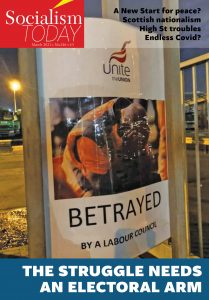
After the defeat of Corbynism within the Labour Party HANNAH SELL looks at the vital question of the struggle for working-class political representation, and the approach currently been taken by different elements of the workers’ movement and left.
In the wake of Starmer’s election as Labour leader there is growing anger among trade unionists at his consistent defence of the interests of the bosses. Ian Hodson, the president of the Bakers’ Union (BFAWU), for example, has reported that a consultation of his unions’ members on disaffiliation from the Labour Party has found that only 9% think that Labour is serving their interests at the present time. In this situation the Trade Unionist and Socialist Coalition (TUSC) – involving the Socialist Party, the RMT transport workers’ trade union, ex-Labour MP Chris Williamson and others – has agreed to relaunch its electoral activities. However, at this moment TUSC’s stance is alone on the left, with most other forces failing to even pose the question of how to fight for workers’ interests at the ballot box.
Read more